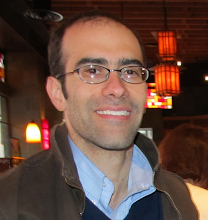One of the three Latin Citations I did for honorary degree recipients at this year's commencement.
Craig C. Mello (1982)
Trailblazing researcher and Nobel Prize laureate, you believed science can change the world – and your study of a tiny worm proved you right. In showing that RNA plays a key role in gene regulation, you have revolutionized the way biologists think about the functioning of cells, creating astounding possibilities for understanding and manipulating the cellular basis of human disease. Your work affirms the importance of basic research, and your discovery is unfolding in new directions that may translate into innovative diagnostic and therapeutic approaches for human disorders, from AIDS and cancer to diabetes and neurodegenerative diseases.
You have spent your life searching for answers, and now your discoveries have profound scientific and medical implications. We are inspired by your passion for discovery and innovation. You have brought honor to Brown, and we salute you as Doctor of Science, honoris causa.
Veri investigans per vias novas donatusque proximo anno praemio Nobel, nobis ostendisti scientiam in melius omnia reformare posse propter ea quae de illo animali minusculo, vermi dicimus, invenisti. Illam enim quasi corporis humani materiae opificinam, quam docti nomine “RNA” designant, partes primas habere in moderando genitalia corpora patefecisti, cuius inventi causâ disciplinae biologicae studiosi melius de operationibus corporum vitalium minimorum intellegunt, causasque morborum humanorum nunc—mirabile dictu!—percipere atque etiam mutare possunt. Tuarum investigationum gratiâ nos quidem recordamur quantum illa fundamenta scientiae, hoc est veri quaerendi ratio, valeant, illi autem studiosi reperiunt vias et cognoscendi et medendi multis aegrotationibus ut carcinomatibus mortiferis, eis morbis quae facultatem corporum movendorum adimunt, quaeque immunitatem naturalem morborum nobis eripit.
Aetatem tuam in indagandis rebus a natura occultatis consumpsisti, quae in lucem a te prolatae ad disciplinas et scientiam et medicam provehendas maximi sunt momenti. Olim apud hanc universitatem studens, eam nunc ut illustris medicus summâ afficis laude, quam ob rem te, veri investigandi omniaque in melius referendi studio permoti tuo, agnoscimus doctorem Scientiae, honoris causa.
Tracking down the truth along new paths, granted a Nobel Prize last year, you have shown us that science can change everything for the better, thanks to what you discovered about that paltry animal—the worm. For you revealed that the factory, as it were, of the raw stuff of our human body, which learned people designate with the term “RNA” has a primary role in regulating genes. Due to this discovery, biologists better understand the workings of cells, and—wonderful to tell!—can perceive and even manipulate the causes of human disease. Because of your research, we for our part call to mind how important those foundations of knowledge are—that is, the methods of research, while scientists for their part are trying to discover ways of diagnosing and healing many diseases, for example deadly cancers, diseases which remove our capability of movement, and that which takes from us our natural immunity to diseases.
You have taken up your life in ascertaining things which are hidden by nature, things which , brought to light by you, are of greatest importance in advancing the fields of medicine and science. Once a student at this university, you now bestow it with great honor, on account of which we, moved by your zeal for investigating the truth and making all things better, recognize you as a Doctor of Science, honoris causa.
Thursday, May 10, 2007
Subscribe to:
Post Comments (Atom)

No comments:
Post a Comment